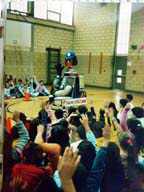When a talking, moving metal contraption made its way into the Kennedy School gymnasium in North Bergen recently, the students had no idea what it was.
“It was weird,” said 11-year-old fifth grader Venus Montesdeoca. “It was wearing glasses and talking. It was all metal and wearing a hat. I thought it was just a pile of recycled stuff.”
However, the students soon found out that the teetering tower of tin was actually something, or perhaps someone, very special.
The special visitor is known as the “Caring Coach,” a working interactive robot who teaches children all over New Jersey about the importance of living a healthy lifestyle.
The program, sponsored by NJ Family Care, which provides either low-cost or no-cost health insurance for children, is designed to go to as many schools in New Jersey as possible to get out the message that the human body is a “million-dollar machine,” that needs general care.
According to Wayne Pollock, the program’s coordinator, the “Caring Coach” visits approximately 250 schools throughout the state during the course of a school year.
“We want to get out to the younger kids, get the message out that they should remember what the ‘Caring Coach’ taught them about healthy living,” Pollock said. “We usually gear the shows toward kids from kindergarten through fifth grades, because after that, the kids are a little too old for Coach.”
The half-hour program changes, depending upon the audience. The younger kids are treated to a program geared toward loving and caring for one’s body and the teamwork involved. The older kids are taught about healthy living and the warning signs of possible addictions.
“The kids are very surprised when they first see the robot,” Pollock said. “They don’t know what to expect. But Coach is almost always well received. The kids are well balanced and take in what Coach has to say. We get letters all the time that the kids talk about Coach for days and weeks after his visit to schools.”
Kennedy School nurse Cheryl Lynch, who coordinated the visit, said that the program was very rewarding for the students. “I didn’t know if it was going to be good or not, but it turned out to be wonderful,” Lynch said. “The robot seemed lifelike, and the kids really interacted with him. I was impressed, and I know the teachers were impressed.”
Lynch learned of the program from Horace Mann school nurse Nancy Carbone, who wanted to have the “Caring Coach” visit that school. However, Coach has to be wheeled into a gymnasium on ground level and cannot climb stairs, which ruled out Horace Mann and enabled the program to move to Kennedy.
Pollock said that the kids at Kennedy were well behaved and a very attentive audience.
“I also think the adults had just as good of a time as the children did,” Pollock said. “The kids can see that.”
Lynch said that she was impressed how the “Caring Coach” taught the students how to wear their seatbelts.
“He wrapped his arms around the kids,” Lynch said. “That taught them well.”
Pollock said that there is a waiting list of perhaps 50 schools that want Coach to pay a visit. The program is free of charge to the schools, which makes it even more appealing.
“It’s a big hit,” Pollock said.
But a big mystery was just how the “Caring Coach” operated. Was there someone inside? Was he remote-controlled?
“I thought that there was someone speaking into a microphone,” Montesdeoca said. “I thought it was cool.”
“I tried to figure out how it worked,” said 10-year-old Samah Elbezaz, also a fifth grader. “It was pretty impressive. He was talking to everyone. I only said ‘Hi,’ but he said ‘Hi’ back to me. I didn’t know how it worked.”
Well, no one’s going to know here.
“How he works is a secret,” Pollock said. “We have a confidentiality clause. We don’t tell anyone. It’s our little trade secret.”
Regardless of the mystery, the students of Kennedy School learned about health and safety from their new friend. “It was a fun way to learn,” Montesdeoca said. “I think it’s going to help me take better care of myself.”
“I learned more about recycling, because I always knew recycling was important,” Elbezaz said. “I thought it was only going to teach us about drugs, but it taught us a lot about other things. I think everyone learned a lot.”
